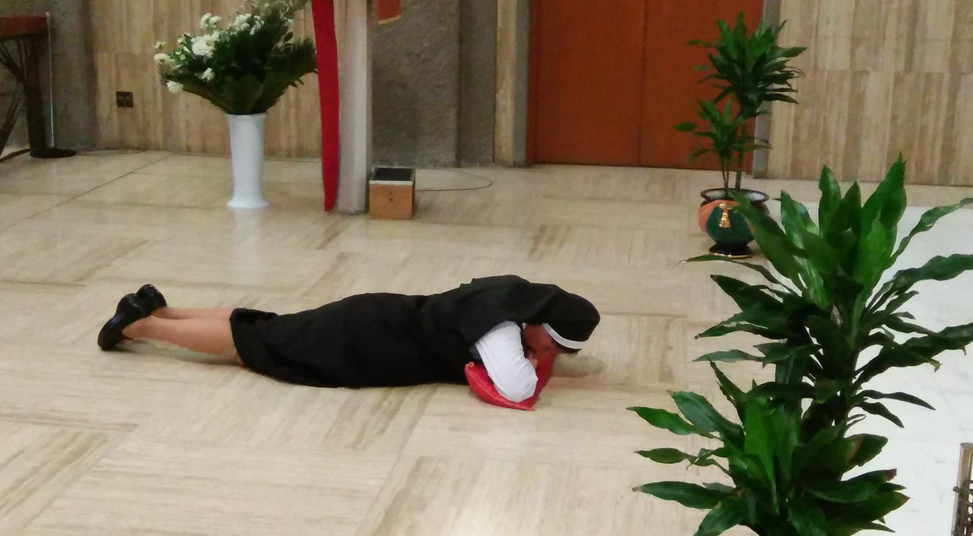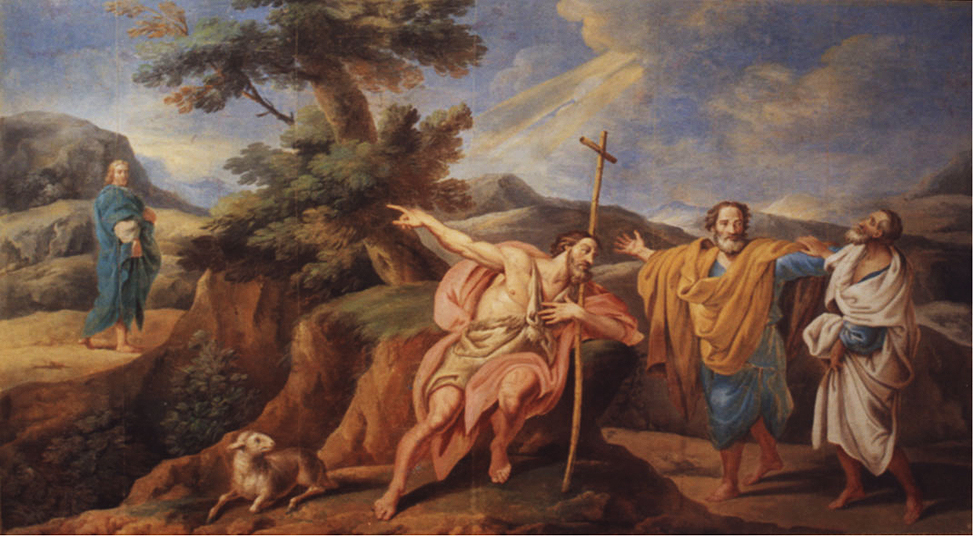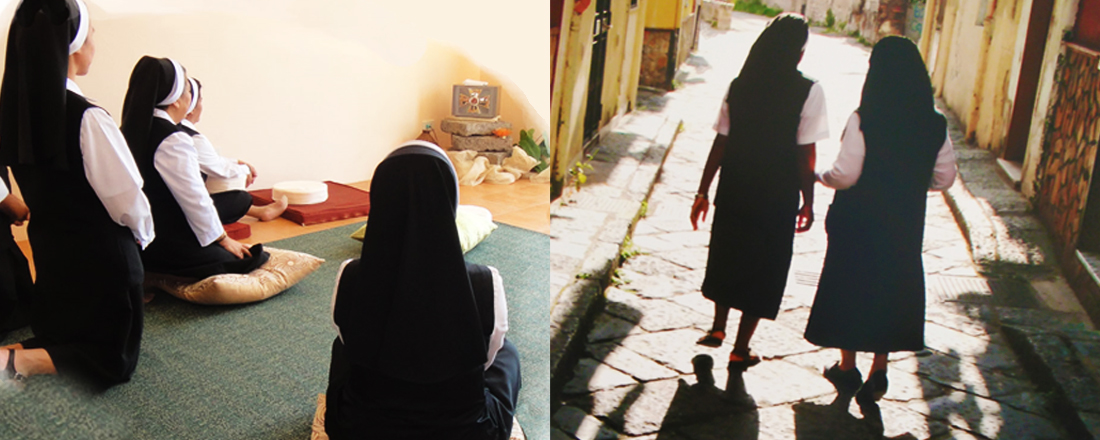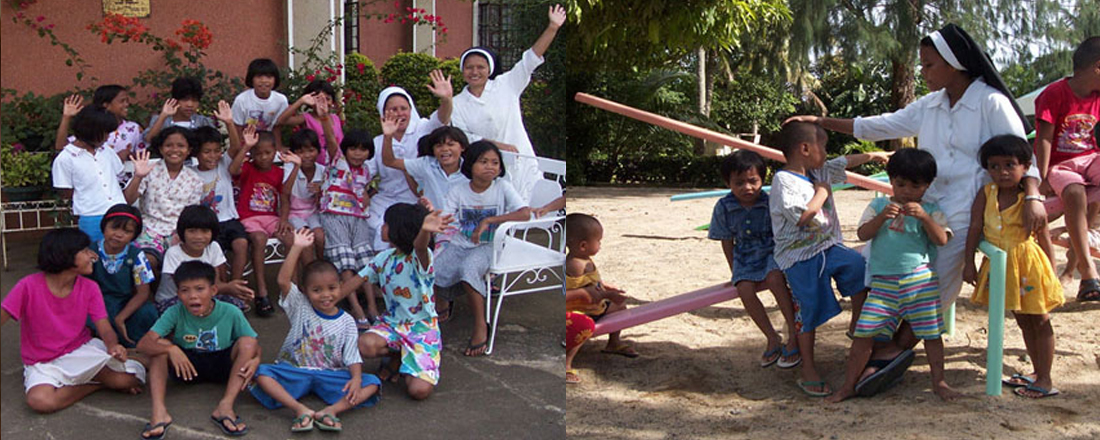WHO ARE WE
CHARISM
“Live the spousal relationship
with Jesus the Nazarene,
in the service to the little ones and the poor,
and like John the Baptist,
prepare His ways.”
We live our spousal relationship with Jesus the Nazarene, who, in total abandonment to the will of the Father proclaims the Kingdom of God and is compassionate towards all, especially to the little ones and the poor.
John the Baptist is the privileged guide who leads to Jesus in preparing the way for Him, in recognizing Him and pointing Him out to the world, in decreasing that He may increase.

-
Live our spousal relationship

This Spousal Relationship calls to mind the particular relationship between Christ and His Church. Christ is the Bridegroom and the Church is his virgin bride. The consecrated life of every Baptistine sister is a nuptial link with Jesus the Nazarene, whose life and mission they strive to perpetuate.
“Spouse of Christ” is the name that St. Alfonso Maria preferred to give to his Sisters. His expression of giving the greatest consideration and respect with the sisters was an encouragement for a serious and responsible pursuit for religious perfection. He often spoke and identified them, "You are the brides of the Nazarene". It is the identity that St. Alfonso Maria accepted for his daughters. He accepted that they are named “Baptistines of the Nazarene ” to give emphasis that they are of the Nazarene, that they belong to Him.
-
with Jesus the Nazarene

“The Nazarene” is a title of deep spiritual impact identifying it as a tender, intimate link between the consecrated person and the Lord; it implies the need for absolute fidelity and a total love expressed by the will to please, and the desire to imitate Jesus.
The original inspiration of the Founder to found the Institute was revealed to him by Jesus the Nazarene in a dream: “I was still a seminarian when I dreamed of Jesus the Nazarene who said to me: ‘Alfonso, you are to found an Institute of Sisters which you will name, “of the Nazarene”… ‘You shall call yourselves the Nazarene because there is not nor can there be a name dearer, sweeter than that of the divine spouse, Jesus the Nazarene.’”
-
In total abandonment to the will of the Father
Abandonment to the Will of God has a profound meaning that includes trust in the Divine Providence, totally placing and leaving oneself in God’s hands as Jesus did, whose earthly life was a constant “Yes” to the Father. Identifying Himself as the beloved Son of the Father, Jesus completely abandoned himself to the Will of His Father, obedient unto death, ready to be emptied.
The origin of the Institute gave importance to the particular aspect of Jesus of Nazareth, totally abandoned to the will of the Father. Inspired by the same Spirit that animated the life of St. Alfonso Maria Fusco, every Baptistine sister strives to allow all her decisions, her response to trials and all her human relationships be influenced by complete confidence in God, in total abandonment to His will. She derives great inspiration from her Founder, who in difficult times would repeatedly say: "Let us leave it to the Lord. "
-
Proclaims the Kingdom of God
The proclamation of the coming of the Kingdom or the reign of God was that significant moment in the public ministry of Jesus’ life that fascinated St. Alfonso Maria Fusco. Following in the footsteps of Jesus the Nazarene, he dedicated himself totally to the evangelization of the people and caring for the needs of the little ones and the poor. He carried out his mission in the streets, intent at fulfilling the plan of the Father, doing good to everyone.
The Apostolic intention of the Institute expressed in current theological terms clearly discloses the original intent of the Founder in founding the Institute. Called to reveal and witness Jesus of Nazareth to the world in the light of and hope in the coming of the Kingdom of God, the Baptistines work for the glory of God in the service of their neighbor through evangelization, education and human promotion of youth, especially the poor, abandoned and at risk, so that they would become promoters of justice and peace in charity for a better future for humanity.
-
Compassionate towards all
Jesus is a remarkably compassionate person. In imitation of Jesus, St. Alfonso Maria Fusco was always ready to help everyone, the poor orphans, outcasts, and sometimes even those little thieves that steal to survive. In his heart, there was a charity that leaves him constantly restless. He wanted to take them off the streets, educate them and form their conscience. His compassion reached out to those many young boys and girls - orphans, deprived of parental care. Wherever there was a problem, he would rush to help. It was the love for Jesus that enabled him to overcome every difficulty. He said in this regard: "Our hearts are like lamps from which two flames must blaze up: one ascending to heaven and the other down to the poorest of our brethren."
-
Especially to the little ones and the poor
St. Alfonso Maria Fusco had a deep fatherly concern for young people. He wrote, "The souls most dear to Jesus Christ and who need the most help are the children”. Yet his concern also reached out to the many other groups in need, particularly the most destitute and marginalized.
Through the Congregation’s Apostolic Fundamental Option specified as ministering to the “youth, especially the poor, abandoned and at-risk”, the Baptistine sisters are open to respond to the needs of the times, like ministries for the care of HIV/AIDS victims, substance abuse, hospital chaplaincy, care for the elderly, etc.
-
John the Baptist is the privileged guide who leads to Jesus

John the Baptist is considered an essential part of the Baptistine Charism. St. Alfonso Maria Fusco’s special devotion to St. John the Baptist, the Patron Saint of Angri and the titular saint of the “Collegiata”, where he was a parishioner and where he was baptized, was prominent in his life. When the Bishop Ammirante expressed his desire to give the name “Baptistines” to the Sisters, the Founder of the Institute submitted himself out of reverence and obedience, and later on agreed to the will of the Bishop, whose task is to recognize and confirm gifts, that both titles be combined to call the Institute, “The Baptistine Sisters of the Nazarene”.
SPIRITUALITY

The spirituality and mission of the Congregation of the Sisters of St. John the Baptist stems from the original inspiration of the Founder, Saint Alfonso Ma. Fusco, to follow in the footsteps of Jesus the Nazarene, dedicating himself totally to the evangelization of the people of Angri and caring for the needs of children. Especially the poor, abandoned, marginalized and at risk.
The spirituality of the Baptistine Sisters flows from the contemplation of Jesus the Nazarene, as He carried out his mission in the streets of Palestine, intent on fulfilling his Father’s project, doing good to everyone, bringing a human touch to people’s relationships and building the Kingdom of God.
There are two spiritual aspects of the life of the Baptistine Sisters, which go right to the very root of their consecrated life and inspire all their actions: “Being spouses of Jesus the Nazarene” and “Trust in the Divine Providence.”
MISSION

The mission of the Baptistine Sisters is inspired by the life of Jesus the Nazarene. It also follows the example of St. John the Baptist, protector of the Institute, and the one who guides the sisters in their commitment to holiness. St. John the Baptist inspires the Baptistine in their mission to “Prepare the way of the Lord” as the sisters lead and empower young people toward achieving Christian values that human dignity.
The Baptistine Mission in the Philippines started on April 23, 1983.

MINISTRIES
Vice Provincial ResidenceSt John the Baptist Community - Superville, Paranaque
Children's Home Ministry
Alfonso Maria Fusco Children's Home - Virac, Catanduanes
Holy Cross Children's Home - Tabaco, Albay
Our Lady of Divine Providence Home - Talisay, Cebu
Retreat and Pastoral Ministries
Sisters of St John the Baptist House of Prayer - Tagaytay
Galilee House of Prayer - Palawig, San Andres, Catanduanes
St John the Baptist Convent - Cagayan de Oro City
St John the Baptist Convent - San Felipe, Zambales
St. Alfonso Maria Fusco Community - Horshiam, Victoria, Australia
Educational Ministry
Ville St. John Academy
Ville St. John School - Virac
Ville St. John School - Cebu
Ville St. John School - Tabaco
Mother Crucifix Caputo Academy
Holy Child Academy - Kinoguitan Misamis Oriental


